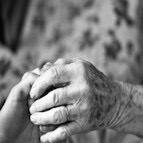 There was a queue of people outside the bread shop – wasps and humans were wanting the sweet things inside. One minute I was looking to see if there was any of the bread I wanted left for sale, the next I was watching the lady in front of me twisting the ball of her foot on the ground, grinding a wasp into the pavement. She turned to me and said ‘they do no good you know, they are completely pointless.’ I can get hooked by incorrect statements and i mildly observed that, maybe surprisingly, wasps pollinate flowers just as bees do. She retorted that bees were okay but wasps were not because they were malicious and stung out of spite. ‘In your story-book’ was my quiet response ….and she was in agreement with this saying that I was about to be stung by the one on my wrist!
There was a queue of people outside the bread shop – wasps and humans were wanting the sweet things inside. One minute I was looking to see if there was any of the bread I wanted left for sale, the next I was watching the lady in front of me twisting the ball of her foot on the ground, grinding a wasp into the pavement. She turned to me and said ‘they do no good you know, they are completely pointless.’ I can get hooked by incorrect statements and i mildly observed that, maybe surprisingly, wasps pollinate flowers just as bees do. She retorted that bees were okay but wasps were not because they were malicious and stung out of spite. ‘In your story-book’ was my quiet response ….and she was in agreement with this saying that I was about to be stung by the one on my wrist!
I left the wasp to walk about on my wrist and then fly off. I bought my loaf of bread and left but afterwards I thought about the wasps and how we can soften our certainties by becoming more conscious of our limited views and so becoming more curious… and also how treating the small creatures of the world with respect is a softening practice to start with, and one which, overtime, can make harshness less and less likely to arise inappropriately – whether for insects or humans. Some of us can become hugely tender to the lives of little creatures but unsurprisingly find the bigger (speaking) ones much more challenging.
Wasps are used in great numbers by farmers in agriculture for pest control, they are predators for all the world’s insect pests. The greenfly in the garden are eaten by them but at this time of year they are very hungry as their main food source, a sugary secretion from the wasp larvae in their nest, is no longer being produced. That’s why they quickly gather round food and are very persistent! The wasps didn’t know that the shop’s air-space and its contents was supposed to be off-limits to them, for them it was suddenly ‘manna from heaven.’
Stinging is their defence mechanism. If a wasp is in trouble it will emit a pheromone which will disturb all the nearby wasps and put them into defensive/ attack mode. So its really best for all concerned to let them be. In my experience, usually, if you are still and calm then creatures can sense that you are no threat.
I think that, from the wasps point of view, suddenly being crushed could well be seen as a malicious act… and as for these humans, do they do good?… What is the point of them? Projecting out anger and hatred onto the other and then reacting violently to what we see is common human behaviour …do wasps behave like this?
If our own concept of functionality is a prerequisite for the continuation of existence of the other then we really have taken over the role of gods (of the ‘all knowing’, ‘all powerful’ but not ‘all loving’ kind). Nevermind this arrogance, at this point in time we seem very close to losing the plot in many different ways. We can now genetically modify mosquitoes so that they will not breed, some would think that this is a very good idea but fortunately there are people who realise that the mosquito is an essential food source for many different creatures. More troublingly the normal molecular structure composed of the four amino acids – the basic building blocks of lifeforms – can now be altered and replicated using other substances. This creates a completely different lifeform and, as a commentator said, ‘this could be quite scary as we have no defences against this organism’…..’err yes indeed!’ i thought … he went on to say ‘but on the other hand if in the future we want populate Mars then producing lifeforms which can cope with radiation etcetera could be very helpful’…. Sometimes I find it very hard to believe my ears – going to another planet, that’s possible,…creating new and potentially dangerous life-forms that’s also possible,… we know so much yet do we know how to be truly alive… what do we know about how to live together, how to care gently for ourselves, each other, and the suffering world that supports us? (link to National Geographic article)
As I remember it, one of the patients in the l’Arche foundation’s first home was bedridden and could do nothing more than move an eye, yet the quality of his being was such that people wanted to spend time in the room with him, not from pity but for grace. Was he pointless? Maybe, but he surely had value. Many activities and qualities like altruism and patience could be deemed pointless…. and tolerance is such a precious quality for living together in this strange world… we are all here, we belong, so how shall we be with each other?
Maybe, for starters, we have to see, to sense, to feel, to be open to the field (you plus me plus the context)… that’s hard to do with hands full of the book of, and both eyes glued to the story of, ‘Me!’.
…and when you see that the wasps persistence is due to hunger and their drowsiness to ‘hypoglycaemia’ then its easy to give some beings what they need – a teaspoon of jam in a dish outside keeps about twenty wasps happy for the day (and it does keep them outside which makes me happy)! The three which looked drowned in the dish this morning, after the rain, surprisingly sprang back into life when I gently emptied it out, but a flat surface would be safer.

 Dorothy Bohm
Dorothy Bohm



 I like to have the fresh air coming in so I often leave my door open.
I like to have the fresh air coming in so I often leave my door open.